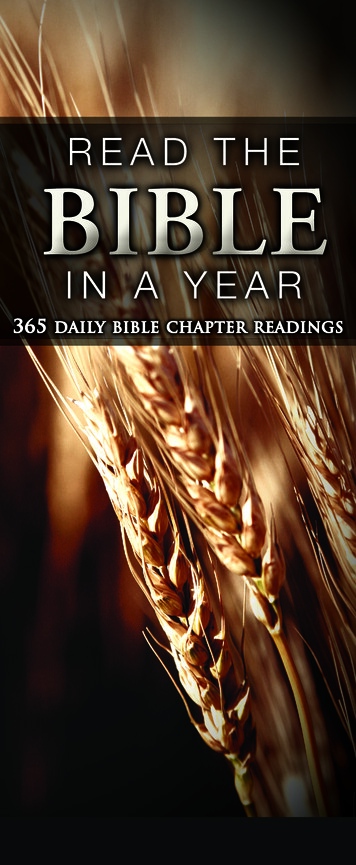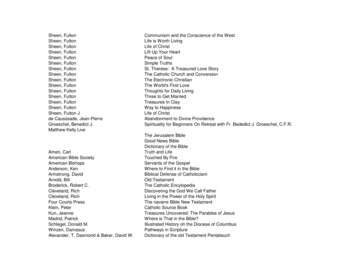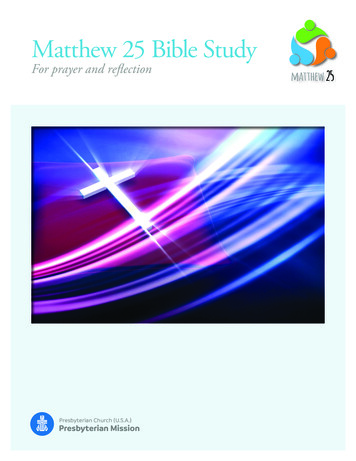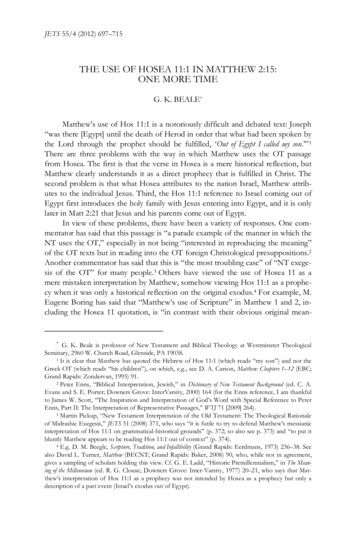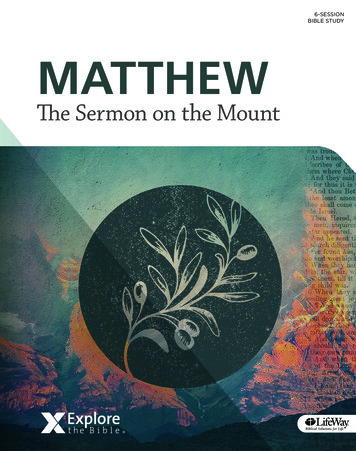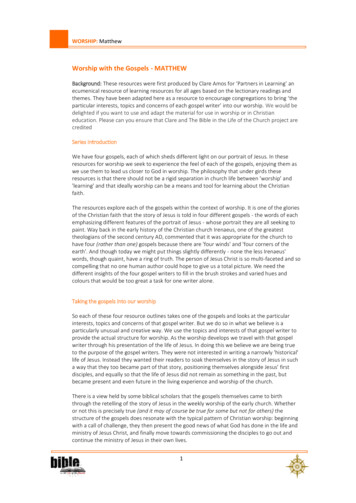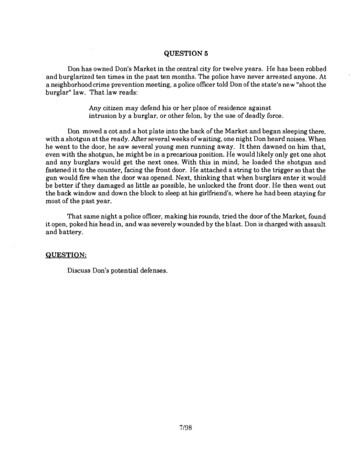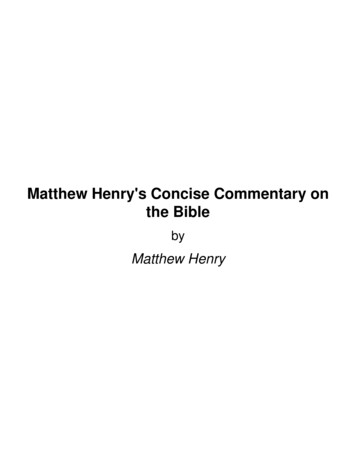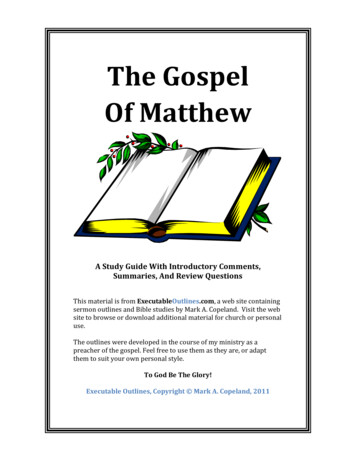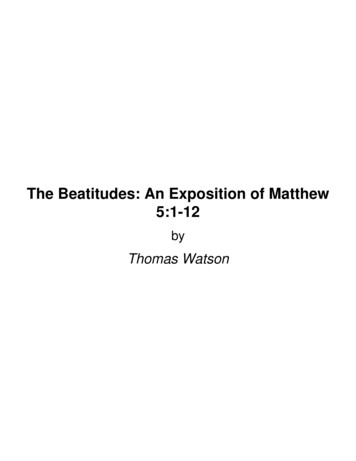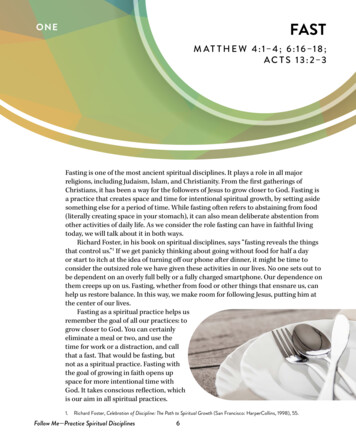
Transcription
FASTONEM AT T H E W 4 :1–4 ; 6 :1 6 –1 8 ;A C T S 1 3 : 2 –3Fasting is one of the most ancient spiritual disciplines. It plays a role in all majorreligions, including Judaism, Islam, and Christianity. From the first gatherings ofChristians, it has been a way for the followers of Jesus to grow closer to God. Fasting isa practice that creates space and time for intentional spiritual growth, by setting asidesomething else for a period of time. While fasting often refers to abstaining from food(literally creating space in your stomach), it can also mean deliberate abstention fromother activities of daily life. As we consider the role fasting can have in faithful livingtoday, we will talk about it in both ways.Richard Foster, in his book on spiritual disciplines, says “fasting reveals the thingsthat control us.”1 If we get panicky thinking about going without food for half a dayor start to itch at the idea of turning off our phone after dinner, it might be time toconsider the outsized role we have given these activities in our lives. No one sets out tobe dependent on an overly full belly or a fully charged smartphone. Our dependence onthem creeps up on us. Fasting, whether from food or other things that ensnare us, canhelp us restore balance. In this way, we make room for following Jesus, putting him atthe center of our lives.Fasting as a spiritual practice helps usremember the goal of all our practices: togrow closer to God. You can certainlyeliminate a meal or two, and use thetime for work or a distraction, and callthat a fast. That would be fasting, butnot as a spiritual practice. Fasting withthe goal of growing in faith opens upspace for more intentional time withGod. It takes conscious reflection, whichis our aim in all spiritual practices.1.Richard Foster, Celebration of Discipline: The Path to Spiritual Growth (San Francisco: HarperCollins, 1998), 55.Follow Me—Practice Spiritual Disciplines6
INTRODUCING THE PRAC TICEdhavehaouat yIn twhhepst oflate, draw or make a litoeatanddr ink sofar today. Use yesterday’s meals if more appropriate.Now, reflect a bit on your notes above with some additional notes or drawing.Did you eat alone or with others?Did you engage in other activities while eating—reading, watching TV, scrollingsocial media, working?Was the meal purely for fuel, or was it enjoyable in another way?Did you spend the time with any kind of spiritual focus—with a prayer, perhaps?OPENING RITUALEach session in this guide includes an opening ritual foryour reflection time. If you are studying with a group, usethe litany responsively. The bold words are repeated foreach session, and may be spoken by the whole group.If you are studying on your own, speak all the linesaloud, knowing that your voice joins with all thosewho are seeking to follow Jesus, wherever they are.7LitanyDraw near to Godand God will draw near to us.When we fast, we free up space to ponderGod’s goodness.Let us keep company with Jesus.Session ONE—Fast
FINDING THE PRACTICEIN THE BIBLEFasting is described in both the Hebrew Scriptures (OldTestament) and New Testament as a faith practice ofindividuals and communities, and includes someof the most recognizable names. In the OldTestament, David fasted with his men when hisfriend Jonathan died (2 Samuel 1:12). Davidfasted alone to pray for the unborn babyconceived with Bathsheba (2 Samuel 12:16).Esther fasted, along with her servants andall the people of Israel in her city, beforegoing to her husband, King Ahasuerus,with a dangerous request (Esther 4:16).Ezra asked the people traveling with himto fast and pray for God’s protection asthey left Persia to return to Jerusalem (Ezra8:21–23). The Hebrew Scriptures mentionmany others who fasted.JESUS AND FA S TINGJesus would have known the stories offasting by the prophets, priests, and kings of hisJewish faith. He would have participated with hisfamily and community in regular Jewish traditionsinvolving fasting. Matthew’s Gospel tells us that Jesusfasted in the wilderness between his baptism and the start ofhis ministry. Later, in the chapters in Matthew called the “Sermonon the Mount” (5–7), where some of his most important teachings are gathered, Jesusgives instructions about fasting to his listeners, and to us. Clearly, fasting was a practicefamiliar to Jesus and the people of his day.What stands out to you in the following verses about Jesus and fasting?Follow Me—Practice Spiritual Disciplines8
Then Jesus was led up by the Spirit into the wilderness to be tempted by the devil. Hefasted forty days and forty nights, and afterwards he was famished. The tempter cameand said to him, “If you are the Son of God, command these stones to become loaves ofbread.” But he answered, “It is written, ‘One does not live by bread alone, but by everyword that comes from the mouth of God.’”—Matthew 4:1–4What might it mean to live “by every word that comes from the mouth of God”in addition to bread?How did fasting help Jesus resist temptation?“And whenever you fast, do not look dismal, like the hypocrites, for they disfigure theirfaces so as to show others that they are fasting. Truly I tell you, they have received theirreward. But when you fast, put oil on your head and wash your face, so that your fastingmay be seen not by others but by your Father who is in secret; and your Father who seesin secret will reward you.”—Matthew 6:16–18What would a social media post by Jesus look like today that reflects the aboveverses?Do you think Jesus would encourage the use of the hashtag #fasting? Why orwhy not?Fasting enabled Jesus to hear God’s call to him. It allowed him the space and time tofocus on what God was asking him to do. In this way, fasting was a very personal act—just Jesus and God in the wilderness, wrestling with temptation. Later, when he spoke tothe crowds listening on the mount, he told them alsoto fast in private. In the same section where he talksabout giving to the poor and praying, he adds fastingFasting is often used as a practiceas a way to practice piety—to grow close to God—asduring the forty days of Lent, followinga personal spiritual act.the model of Jesus in the wildernessIf you were to practice fasting, who wouldin Matthew 4. Watch the YouTubeyou be inclined to tell?video “40 – A Video of Jesus in theWilderness” (bit.ly/FMJesusWilderness,4:05). This short video reflects howSimon Smith imagines what those fortyWhat would it be like not to tell anyone else?days might have been like for Jesus.9Session ONE—Fast
FA S TING IN AC T SThe early church included fasting as a practice from their earliest gatherings. Whilewe can assume the private fasting Jesus encouraged continued, communal fasting alsohappened as a way to listen to God, and to prepare for ministry in God’s name. We readin Acts about the first Christian church in Antioch where fasting was part of worshipand preceded the commissioning of disciples.While they were worshiping the Lord and fasting, the Holy Spirit said, “Set apart forme Barnabas and Saul for the work to which I have called them.” Then after fasting andpraying they laid their hands on them and sent them off.—Acts 13:2–3How does this communal fasting compare to the private fasting Jesusdid in the wilderness?After Barnabas and Saul (Paul) are sent out, they travel to multiple locations,teaching about Jesus and helping establish brand-new churches. They do not have aneasy time of it. But read what they do wherever they go:After they had proclaimed the good news to that city and had made many disciples, theyreturned to Lystra, then on to Iconium and Antioch. There they strengthened the soulsof the disciples and encouraged them to continue in the faith, saying, “It is through manypersecutions that we must enter the kingdom of God.” And after they had appointedelders for them in each church, with prayer and fasting they entrusted them to the Lordin whom they had come to believe.—Acts 14:21–23The early church saw fasting as a way to discern the will of God, and toprepare for ministry in God’s name. What do you read here that remindsyou of your own faith community?Follow Me—Practice Spiritual Disciplines10
FINDING THE PRACTICETHEN AND NOWFollowing the tradition of the earliest disciples, fasting has been a staple in Christianlife for centuries. Christians in Orthodox traditions and many in Africa, Asia, and LatinAmerica have always maintained fasting as a central and regular practice, alongsideprayer and giving to the poor. In the West, and in most Protestant denominations, thecentrality of fasting declined during the twentieth century. A new appreciation forsimple, ancient spiritual practices has resulted in a resurgence of interestin how fasting can help us follow Jesus.In recent years, forms of fasting have caught on in the widerculture too. Do an internet search on “fasting” and the firstresults you see are likely to be about intermittent fastingfrom food as a way to lose weight. People fast fromspecific kinds of foods or for specific periods of timefor medical or dietary reasons. People today alsofast for periods of time from media, social media,cellphones or shopping to clear their minds andsimplify their lives.So, what makes a fast uniquely Christiantoday? Christian fasting is the voluntary denialof something for a specific time, for a spiritualpurpose. It is undertaken voluntarily by anindividual, family, community, or nation.The specific time is typically part of a day, awhole day, a few days, a week, or seasonally,like during the forty days of Lent. Christiansfast for repentance, to clarify and intensify ourprayers, to ask God for guidance, to invite Godto purify our hearts, or to free up money or otherresources to give to people who are poor or toChrist’s mission. Fasting in the Bible almost alwayshas a component of prayer, and Christians who fastfor spiritual reasons from food, or other aspects of dailylife, report that fasting focuses their prayers. The key is toconnect fasting from something to making space and time forGod. Otherwise, we are just dieting.Which of the Christian reasons for fasting resonates with you?11Session ONE—Fast
LENT IN THREE MINUTESFasting is often talked about during theseason of Lent. Watch the YouTube video “Lentin 3 Minutes” (bit.ly/FMLentInThreeMinutes, 3:00)to learn more about three traditional Lentenpractices of fasting, praying, and almsgiving.If you did a Lenten fast, what would you give up?If you are considering fasting, perhaps as part of a Lenten discipline, take note ofAugustine of Hippo’s sage advice in one of his sermons from fifth-century North Africa:You must certainly beware of just revising, notreducing, your pleasures. I mean, you can see somepeople searching out unusual liquors as a substitutefor the usual wine . . . and concocting delicacies . . .which at other times they are ashamed to bother with.The result is that the observance of Lent means, notthe repression of old lusts, but the occasion for newenjoyments. . . . Let your fasting be accompanied byfrugality.2In other words, if you fast from eating meat during Lent, don’t substitute fancy takeout vegan dumplings instead. Just eat something simple.2. Sermon 207, Essential Sermons: (Classroom Resource Edition) (The Works of Saint Augustine: A Translation for the 21stCentury), 260. Daniel Doyle New City Press, Hyde Park, 2007Follow Me—Practice Spiritual Disciplines12
PRACTICING THE PRACTICELike all spiritual disciplines, fasting can be practiced in a variety of ways. For some,fasting might mean avoiding meat on Fridays during Lent. (You may have been servedfish in your school cafeteria because of this practice.) For others, it might mean skippinga meal to attend a lunchtime prayer service. Still others might fast with a group of peopleto raise money for a cause. A number of ideas are presented here. Choose one or two to try.FA S TING FOR J US TICEOne spiritual focus while fasting is to show solidarity with those who are fooddeprived. Take the money saved by not eating a meal and give it to an organization thatserves meals to people who need them. Fasting with this purpose in mind can serve asa reminder that all of our daily bread is a gift from God. The prophet Isaiah told ancientIsrael that solemn assemblies and denial that serve only those fasting is not whatGod wants. Instead, God desires fasting that leads to justice, transformed lives, and arenewed world for all.Isaiah 58:5–8 tells about the kind of fasting that pleases God. As you read theseverses, underline what stands out to you. Then think about how you might use your fastto show solidarity with people who are hungry, homeless, or face other injustices.Is such the fast that I choose,a day to humble oneself?Is it to bow down the head like a bulrush,and to lie in sackcloth and ashes?Will you call this a fast,a day acceptable to the Lord?Is not this the fast that I choose:to loose the bonds of injustice,to undo the thongs of the yoke,to let the oppressed go free,and to break every yoke?Is it not to share your bread with the hungry,and bring the homeless poor into your house;when you see the naked, to cover them,and not to hide yourself from your own kin?Then your light shall break forth like the dawn,and your healing shall spring up quickly;your vindicator shall go before you,the glory of the Lord shall be your rear guard.—Isaiah 58:5–813Session ONE—Fast
PL ANNING A FA S TFasting from food is not possible for everyone. It is not recommended for expectantmothers, or for people with certain medical conditions or a history of eating disorders.The ability to fast from food is a mark of privilege for those who have plenty, who areassured of having enough to eat when the time comes to break the fast. The spiritualdesire to make space for God is possible to practice in other ways.Fasting creates space in our lives so that we can keep company with Jesus. ManyChristians who fast from meals or media use the time that’s been freed up to pray,read the Bible, and meditate on God’s goodness. Fasting can transform us furtherinto Christ’s image because our deep desires are revealed when we fast, as well as ourdependence on the item from which we are fasting.What is taking up more space and time in your life right now than you want it to?Social media? Watching television or movies? News? Junk food? Shopping? List a few: Choose one for your fast, and circle it. Consider what portion of time you can fastfrom what you circled. There are many options to plan a fast. It doesn’t require you tocut out everything for a whole day or longer. Start with a few hours. Or consider fastingonly on certain days of the week; fasting only during daylight hours, as Muslims practiceduring Ramadan; or fasting through a single meal or other recurring event each week.Choose a time period that will enable you to spend that time instead on somethingfaith-related. Will you fast for . . .A portion of a day? Note the hours:A full day? Note the day:A full week? Schedule the week:3. Jen Hatmaker, Simple and Free: 7 Experiments Against Excess,(New York: Convergent Books, 2021), 208.Follow Me—Practice Spiritual Disciplines14“If a fast doesn’t includeany sacrifices, then it’s not a fast.The discomfort is where the magichappens. Life zips along, unchecked andautomatic. We default to our lifestyles,enjoying our privileges tra la la, but a fastinterrupts that rote trajectory. Jesusgets a fresh platform in the emptyspace where indulgence resided.” 3
FILLING YOUR PL ATEIf fasting as a spiritual discipline is to help us keep company with Jesus, it takesintention. As you plan to eliminate a meal or other distraction, consider how you willfill the time and empty space with a focus on God, and others of God’s children. Here aresome ideas. Which one(s) might you try? Use this table grace from Latin America as a prayer to focus your thoughtsduring a fast.“O God, to those who hunger give bread;and to us who have bread, give the hunger for justice. Amen.”4“Our feeding onJesus, in the eucharistof course, but in so manyother ways too, is our prayerfor God’s own life, made flesh inJesus, to clothe itself afresh withus, to get (as we say) into ourbones and our bloodstreams,our thinking, our decisions,our leadership.”5 Fast while working for hunger relief. Read about Breadfor the World’s call to end hunger in the United States by2030. In 2017, they launched a project to encourage fastingon the 21st of each month (because that is the day whenSNAP benefits run out for families.) At the same time, theyencourage advocacy for Congressional legislative changes.See bit.ly/FMForSuchATime.Other suggestions: Experiment with a new form of prayer when you fast. Read Scripture or a devotional while you fast. Find a partner with whom to fast. Plan together andcompare notes. Fast with a small group or family group. Simplify a meal rather than skipping it. Break your fast with communion.How can you “feed on Jesus” in a way that gets intoyour bloodstream and thinking?There is plenty of guidance onChristian fasting available online.Here are a few sources for moreinformation: A Beginner’s Guide to ChristianFasting from Virginia TheologicalSeminary’s Building Faith blog(bit.ly/FMGuideToFasting) Fasting and Freedom fromThe Upper Room (bit.ly/FMFastingAndFreedom) Fasting 101 PDF from DurhamCrop Walk, adapted from theOffice of Spiritual Formation,Presbyterian Church (U.S.A.),2003 (auto-downloaded at bit.ly/FMFastingConsiderations)4. Web Editors, "Prayer of the Day: Latin American Prayer," Sojourners, February 6, rayer.5. N. T. Wright, Twelve Months of Sundays, Years A, B, and C: Biblical Meditations on the ChristianYear (Morehouse Publishing, 2012), 97.15Session ONE—Fast
FO L LOW I N G J E S U SWe have seen how fasting was a common way that Jesus and his friends and earlyfollowers connected with God. Fasting today can be more than a way to diet, when itis intentionally undertaken as a way to make space for God. We have explored someways to plan a fast from food or other distractions, and set some intentions to try it fora period of time. We have also considered some ways fasting can be the impetus to turnus from our own growling stomachs to the needs of others in our ongoing work withGod for justice.You might find that fasting is a spiritual discipline you would like to maintain ona regular basis, perhaps each Lent, or on another schedule. As with all the spiritualpractices we will consider, fasting does, indeed, take practice. It also overlaps with eachof the other practices we will look at, like prayer, simplifying, listening to God, and more.All of these are ways we seek to make space in our lives so we can draw near to God.We will turn to prayer next, for another small taste of a banquet of God’s grace we areoffered in these disciplines.In closing, play and listen to the YouTube video “Isaiah 58 ( feat. Amena Brown)”(bit.ly/FMIsaiah58, 2:29).Follow Me—Practice Spiritual Disciplines16
Richard Foster, Celebration of Discipline: The Path to Spiritual Growth (San Francisco: HarperCollins, 1
